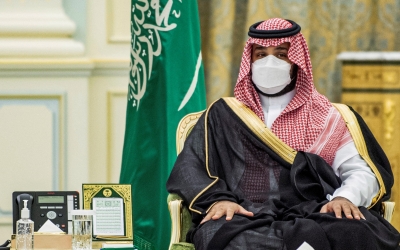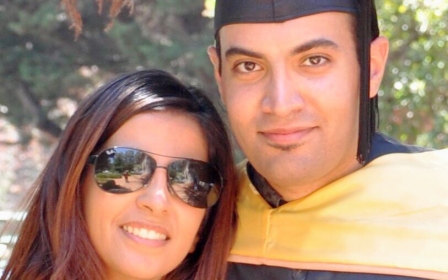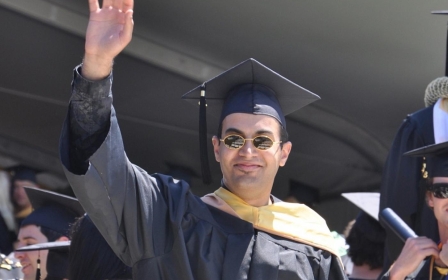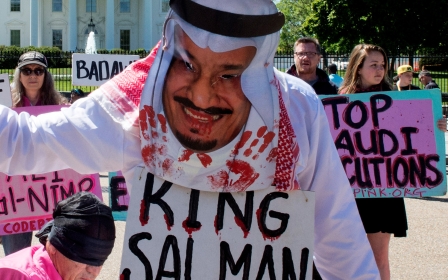US denounces Saudi court sentencing of aid worker to 20 years in prison
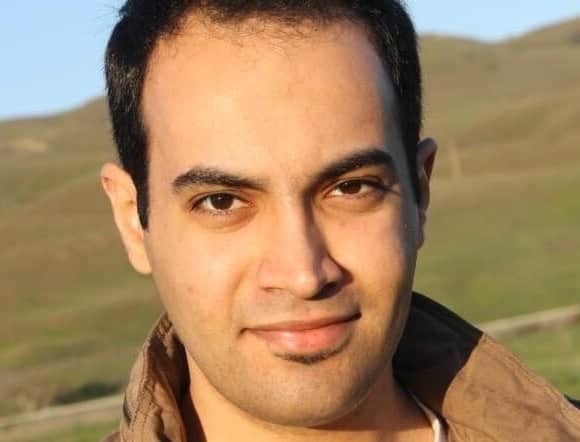
The United States has condemned a Saudi court's decision to sentence a local aid worker to 20 years in prison for allegedly running an anonymous social media account.
The State Department, in a statement on Tuesday, said it was "concerned" over reports that Saudi Arabia's terrorism court sentenced Abdulrahman al-Sadhan to 20 years in prison in addition to a subsequent two-decade travel ban.
"As we have said to Saudi officials at all levels, freedom of expression should never be a punishable offense," the department said, adding that it would be following the case closely throughout any appeals process.
Abdulrahman, 37, was detained in March 2018 from the Red Crescent offices in Riyadh, where he worked. It took a month for his family to be informed of his detention and another three years of being held without trial or charge for the government to levy a court case.
During his initial three years in prison, his family had only been allowed to speak to him once - a one-minute phone call that took place last year.
New MEE newsletter: Jerusalem Dispatch
Sign up to get the latest insights and analysis on Israel-Palestine, alongside Turkey Unpacked and other MEE newsletters
'Peaceful dissent is not terrorism'
- Bethany Alhaidari, The Freedom Initiative
"My family is devastated," Abdulrahman's sister, Areej al-Sadhan, said in a statement on Tuesday.
"This sentencing is unjust and Abdulrahman should never have been in prison in the first place... We fear that, unless this initial ruling is overturned, we may never see Abdulrahman again. We are calling on officials to help us end our family's suffering and get Abdulrahman back home with us in California where he belongs."
Over last three years, Areej, a US citizen living in San Francisco, had helped elevate her brother's case to the extent that Speaker of the House Nancy Pelosi, who represents San Francisco, mentioned him within a statement about the declassified intelligence report on the killing of Jamal Khashoggi in February.
In her statement, Pelosi was critical of the Saudi government, particularly Crown Prince Mohammed bin Salman, who intelligence officials named responsible for the 2018 murder and dismemberment of Khashoggi at the Saudi consulate in Istanbul.
Ali al-Ahmed, a Saudi critic living in the US, expressed concern that US support for Abdulrahman could have led to the lengthy prison term.
Ahmed, who claims he knew Abdulrahman before his detention, said in a series of Twitter posts that Monday's sentencing was a "test" for Secretary of State Antony Blinken and "his ability to match human rights actions to his statements on it".
"If you cannot succeed with allies, you won't with rivals," Ahmed said in a series of posts to Twitter.
Twitter crackdown
Ahmed himself is connected to the Sadhan case in that the Saudi government is believed to have been alerted to both their Twitter accounts by two former employees of the social media platform who are accused of accessing and passing the details of more than 6,000 users critical of Riyadh to a Saudi official with close ties to the royal family.
Last year, Ahmed filed a US lawsuit seeking damages from Twitter, alleging that many of those exposed have since been killed or tortured.
Similarly, Abdulrahman's disappearance is believed to be a direct result of the actions of the two alleged Twitter spies.
"To reach a point where they hack foreign companies, use spyware, bribe spies to leak information from a company based in a country that is an ally of Saudi Arabia, is really shocking," Abdulrahman's sister told Middle East Eye earlier this year.
Former royal court adviser Saud al-Qahtani alluded to such practices in August 2017, when he used his verified Twitter account to boast that Riyadh had "technical ways" and a "secret I'm not going to say" to track down anonymous accounts.
"Does a pseudonym protect you from the blacklist?" Qahtani tweeted at the time. "No."
The former adviser's profile has since been permanently banned for violating Twitter's manipulation policies. He served as a close aide to the Saudi Crown Prince until he was removed, after being implicated in Khashoggi's murder.
Bethany Alhaidari, the Saudi desk officer at the Freedom Initiative, condemned Abdulrahman's sentencing and said it further highlighted the kingdom's pattern of repression against peaceful human rights activists.
"Abdulrahman's sentencing is part of an alarming and growing pattern in Saudi courts, where peaceful dissent against the government now carries a harsher sentence than even murder or other violent crimes. Peaceful dissent is not terrorism."
In Tuesday's statement, the State Department vowed to continue pressuring the kingdom to come into compliance with international human rights standards.
"We will continue to elevate the role of human rights in our relationship with Saudi Arabia and encourage legal reforms that respect the human rights of all individuals," the department said.
Middle East Eye delivers independent and unrivalled coverage and analysis of the Middle East, North Africa and beyond. To learn more about republishing this content and the associated fees, please fill out this form. More about MEE can be found here.


